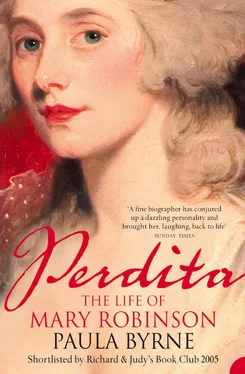Admirers began to address her through the medium of the daily press. The Morning Post printed a long and not a little voyeuristic letter to her. ‘Madam,’ it began,
Criticism is a cold exercise of the mind: but as I feel an inexpressive glow, while my imagination takes your fair hand in mine, I think I may venture to court your acceptance of two or three remarks, which are conveyed in a temperament of blood somewhat differing from the chill, and the acid of the critique. I am the veriest bigot to old Shakespeare. – The Genius himself could not have gazed upon you with more delight; nor have forerun your motion, action , and utterance, with more tremulous solicitude for your excellence in Viola , than I did. Shakespeare’s principal substantives should never be sunk , nor kept back , as it were, from the attention, by an emphatic tone upon his epithets.
In the manner of speaking the ‘ green and yellow melancholy ,’ I would, sweet woman, that the yellow tinge appeared no more than equal to the green ; and, that the melancholy so coloured should have a principal share of your voice to mark the subject.
I have seen you too in Fidelia , and am apt to think, that the tone , force , and manner of tragedy make a kind of apparel, both too magnificent , and too solemn , for the sentimental part of comedy.
BO-PEEP 13
The author sounds as if he would very much like to pay a private visit to her dressing room in order to advise her upon her Shakespearean epithets.
She also played the female lead in Florizel and Perdita . This was Garrick’s 1756 version of the final two acts of Shakespeare’s The Winter’s Tale . It was revived by Sheridan, after fourteen years’ absence from the repertoire, on Saturday, 20 November 1779, in memory of Garrick, who had died earlier that year. It centred on the young lovers, Prince Florizel and Perdita, who is supposed to be a shepherd’s daughter but is really a princess. It included a sheepshearing song, sung by Perdita, and a dance of shepherds and shepherdesses. Mary’s performance was a success, though the Morning Post complained ‘Mrs Robinson’s Perdita would have been very decent, but for that strange kind of niddle to noddle , that she now throws into every character, comic, as well as tragic.’ 14
At the second presentation, the following Tuesday, she was honoured by the presence of such leaders of London society as the Duke and Duchess of Devonshire, Lord and Lady Melbourne, Lord and Lady Spencer, Lord and Lady Cranbourne, and Lord and Lady Onslow. After this performance the Gazetteer and New Daily Advertiser published a long criticism. It said that the piece ‘is in general well cast and ably performed’, but reservations were expressed about the costumes:
The dresses on which much of the effect depends, were liable to very glaring objections. Shakespeare has been particularly attentive to the dress of Florizel and Perdita:
Your high self you have obscur’d
With a swain’s wearing, and me poor lowly maid,
Most goddess-like, prank’d up—
To correspond with this description Florizel and Perdita have hitherto appeared in beautiful dresses, covered with flowers of both the same pattern, and she wore an ornamented sheep hook, instead of which Mrs Robinson appears in a common jacket, and wears the usual red ribbons of an ordinary milk-maid, and in this dress she also appears with the King to view the supposed statue of Hermione, after she is acknowledged his daughter. 15
For most of the audience, though, the figure-hugging jacket and milkmaid’s ribbons were exactly what they wanted to see. Takings were excellent and the show played again on the next Friday night and the Monday and Wednesday after that. Mary gained further public exposure when the Morning Post printed her poem ‘Celadon and Lydia’. 16 Then on Friday, 3 December 1779 there was a royal command performance. A full house was assured. Mrs Robinson was about to become ‘the famous Perdita’.
PART TWO Celebrity
CHAPTER 8 Florizel and Perdita
Her name is Robinson, on or off the stage for I have seen her both, she is I believe almost the greatest and most perfect beauty of her sex.
George, Prince of Wales
King George and Queen Charlotte were ardent lovers of the stage, commanding over three hundred performances between 1776 and 1800. The King preferred modern comedies, calling Shakespeare ‘sad stuff’. He also preferred the Theatre Royal in Covent Garden to its rival. Especially after Sheridan took over Drury Lane, and became more and more closely identified politically with the radical Whig faction of Charles James Fox, the two theatres – situated within a few hundred yards of each other – were seen as reflections of the political divisions within Parliament. Drury Lane was regarded as the Opposition’s theatre, Covent Garden as the Government’s. So the appearance of the royal family at Drury Lane on 3 December 1779 was a very special occasion.
They arrived at a door situated near the stage door. The royal box was next to the proscenium on the audience’s left-hand side and always especially fitted up at command performances. The royals were met by one of the proprietors of the theatre. Equipped with a candelabrum, and walking backwards to face the King, he led them through a private corridor that gave direct access to the box. The King would pay £10 on every night that it was occupied. The royal party was presented with special playbills printed on satin. As the King came within sight of the audience, everybody stood up and applauded. The greeting was returned with a bow. The family would have had a very close view of the stage, and would even have been able to see the actors waiting in the wings.
Accompanying the King and Queen that night was 17-year-old George, soon to become Prince of Wales and eventually King George IV. He was dressed in blue velvet trimmed with gold and wore diamond buckles on his shoes. He would have sat in the Prince’s box, which was adorned with his motif of three feathers and situated directly opposite the King’s – and equally close to the stage.
The Prince at the age of 17 was not the fat, lecherous, dissipated hedonist of later years, depicted in so many satirical cartoons. When Mary first met him he was handsome, cultivated, and good-tempered. He was known as a man of enormous charm, intelligence, and taste. Mary was not exaggerating when she described him as ‘the most admired and most accomplished Prince in Europe’. 1 He fenced and boxed, but also played the cello, drew and had a deep appreciation of painting. One of the members of the royal household, Mrs Papendiek, wrote in her journal, ‘he was not so handsome as his brother, but his countenance was of a sweetness and intelligence quite irresistible. He had an elegant person, engaging and distinguished manners, added to an affectionate disposition and the cheerfulness of youth.’ 2 In a letter to his first love, Mary Hamilton, written when he was 16, he described himself as follows:
Your brother is now approaching the bloom of youth. He is rather above normal size, his limbs well proportioned, and upon the whole is well made, though he has rather too great a penchant to grow fat. The features of his countenance are strong and manly, though they carry too much of an air of hauteur. His forehead is well shaped, his eyes, though none of the best, and although grey are passable … His sentiments and thoughts are open and generous. He is above doing anything that is mean (too susceptible, even to believing people his friends, and placing too much confidence in them, from not yet having obtained a sufficient knowledge of the world or of its practices), grateful and friendly to an excess where he finds a real friend . His heart is good and tender if it is allowed to show its emotions … Now for his vices, rather let us call them weaknesses. He is too subject to give vent to his passions of every kind, too subject to be in a passion, but he never bears malice or rancour in his heart. As for swearing, he has nearly cured himself of that vile habit. He is rather too fond of Wine and Women, to both which young men are apt to deliver themselves too much, but which he endeavours to check to the utmost of his power. But upon the whole, his Character is open, free and generous. 3
Читать дальше












